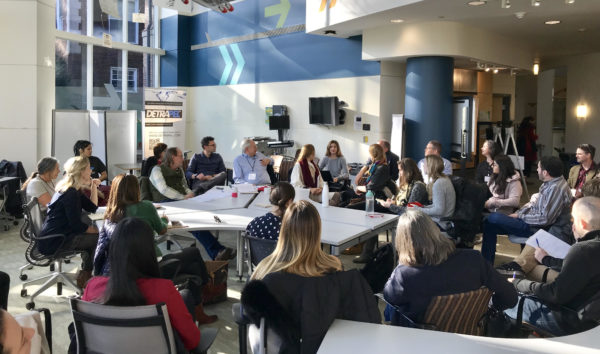Founders of Leading-Edge Cooperative Organic Valley Come to Babson
“Business is all about relationships,” the CEO said. We were not in a classroom or theater listening to a man in a suit. We were seated around a sun-drenched table in the Blank Center co-working space listening to a back-to-the-land hippie farmer who thirty years ago started CROPP (Cooperative Regions of Organic Producer Pools), parent of now national name brand Organic Valley.
Business is all about relationships. George Siemon’s comment was part of his response to a question about culture: “How do you ensure you preserve your culture and mission as you expand?”
In 1988, Organic Valley was 7 farmers and a dream. Today, it is 2,200 farmers, 900 staff and 120 milk routes that bring fluid milk to 90 processing plants, which in turn generate 600 SKUs (shop-keeping units, the industry jargon for unique products) for 300 retailers. It’s a supply-chain business, $1.2 billion dollar brand, and wholly farmer-owned cooperative—arguably the most successful in North America.
“Like any other part of your business,” George went on, “if you want to preserve your culture, you must invest in it. You must focus on it.”
Food Sol’s long-time colleague, collaborator and champion Bob Burke (M’87) had connected us to Elizabeth Horton who was coordinating a Boston visit for Organic Valley. While in town, the pioneers agreed to visit Babson for a special Community Table. Beside George were Mike Bedessem, former CFO now VP of Business Development, and Theresa Marquez, former CMO now Chief Mission Officer.

Thirty-nine attendees turned out, including Babson undergraduate and graduate students, faculty, staff, alumni, MBAs from other Boston-area business schools, and food-business professionals. In a tight 60 minutes, we managed to touch on an impressive array of topics: The balance and tension between business and mission; the organic standard; cooperatives; meaningful employment; authentic marketing; running a supply chain business; channels; changing consumer profiles; novel business models; non-traditional financing options; climate change; family farmers; and the Amish.
“We can stay all day!” Mike Bedessem said gleefully. Our guests were clearly energized by the crowd.
What energizes guests to Food Sol? Why do more and higher profile food business leaders want to come to Babson? After six and a half years of leading Food Sol, I can say with confidence that it is our culture—the deeply embedded, shared understanding of how to show up, participate, and share value.
Culture runs on relationships, which in turn runs on authenticity. “In this day and age,” said George, “you have to really be who you are.”
Both Mike and Theresa said they pinch themselves when they think about their jobs. Yesterday was certainly a pinch moment for me. As for an Organic Valley-Babson relationship, there is clearly more to come.
